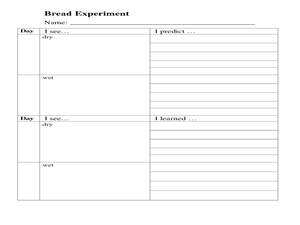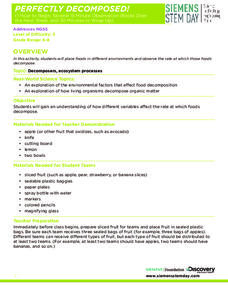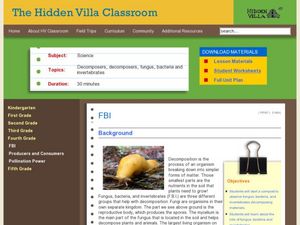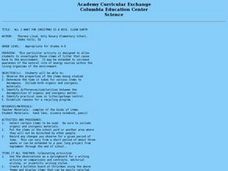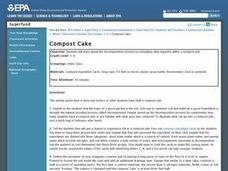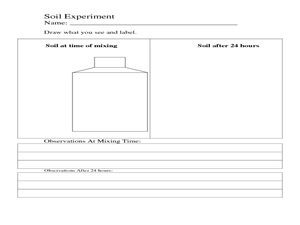Captain Planet Foundation
Worm Your Way Out of This
How can you provide healthy soil for your garden? Study worms, bacteria, and other microorganisms in a lesson about decomposition and organic compost. After discussing what you know about worms and watching a video, watch what worms do...
Curated OER
Forest Decomposition
Young scholars explore decomposition. Students define and describe components of the decomposition process. Young scholars make a composter in a terrarium. Students record observations and changes weekly, drawing conclusions about...
Curated OER
Worm Composting
Second graders discuss worm composting. In this decomposition lesson, 2nd graders look at the anatomy of the worm and how it eats food. They have their own worm bin and review what foods can and can not be given to the worms for...
Curated OER
Buried Treasure
Students examine the role of micro and macro organisms in the decomposition process. They record their observations and discuss. They also read a book about decomposition.
Discovery Education
Perfectly Decomposed!
We all know someone who won't eat the banana with a brown spot, the grape with a dimple, and the apple with a bruise. Scholars use different fruits to explore what happens when fruits really start to decompose. They set up an experiment...
Curated OER
Up the Down Tree House
Students investigate the decomposition process. In this ecology activity, students participate in a play, "Up the Treehouse" where the main idea focuses on a decomposing tree and how food chains are effected by decomposition. After the...
Curated OER
Garbage in the Garden
Students create their own compost. In this soil lesson, students fill a bag with waste and soil, in order to create a mini compost bin. Students observe the baggies over a 6 week period, they record their findings and collect data...
Curated OER
Decomposers- Nurse Logs
Learners investigate temperate forest ecosystems. In this environmental lesson plan, students discover different forms of decomposition and its effect on the environment.
Curated OER
Science: Fossil of a Carbonized Plant
Students classify leaves by shape and margins and use them to create models of plant fossils. By using paper over a leaf, they simulate fossilization of organisms onto sedimentary rocks. Following instructions on worksheets, students...
Curated OER
FBI
Fourth graders experiment with compost. For this Science lesson, 4th graders begin a worm compost as well as an outdoor compost. Students discuss decomposition.
Curated OER
Compost in a Bag!
Fourth graders experiment to see which objects decompose. In this compost lesson, 4th graders observe the changes of labeled objects in a bag. Leave the objects for one month and record the changes by observation and weight. Students...
Curated OER
The Value of a Garden
Students explore the history of taxonomy, the work of Carl Linnaeus, and the factors involved in the decline and extinction of a variety of botanical species.
Curated OER
Vermicomposting
Third graders study vermicomposting. In this vermicomposting lesson, 3rd graders prepare to begin a unit on decomposition by constructing a worm bin. Students collect worms to be used later in experiments.
EnLiST
Trap Your Own Insects: What’s in Your Backyard?
Young entomologists construct three types of insect traps—pitfall, pollinator, and panel—before setting their traps out and observing what they caught. They then observe what types of insects the different traps attract.
Curated OER
Decomposing Artifacts
Seventh graders participate in an experiment in which they calculate the time of decomposition of different materials. In groups, they fill bags with different materials and cover them in soil. After six months, they create a line graph...
Curated OER
All I Want for Christmas is a Nice, Clean Earth
Students observe properties of items, determine time it takes for organic/inorganic items to decompose, identify differences/similarities between decomposition, identify practical uses in litter/garbage control, & establish reasons...
Curated OER
Forensic Entomology: What the Blowfly Saw
Students read a paragraph describing various insects and decomposition rates, then fill in the table indicating when the three insects arrived or left the body. They write paragraphs explaining when the person died, and how they know.
Curated OER
Activity #19 Oxygen For Yeast
Students observe and record what occurs when yeast is added to hydrogen peroxide. They indicate why a chemical reaction (decompostion) must have occurred during the experiement. Pupils explain why yeast was used. Students comprehend the...
Curated OER
Compost Cake
Students examine the decomposition process. They create their own class compost pile and record their observations. They discover which materials decompose at a different rate.
Curated OER
Under Our Feet
Students investigate the forest ecosystem to learn of the living and non-living elements of the soil. For this ecosystem lesson, students examine soil for twigs, moss, fungi, leaves, roots and other matter. Students...
Curated OER
Fossil Formation Fun
Students compare the three types of fossils: preserved organisms, mineral replacement fossils, and impression fossils. They create a model of amber,
sponge fossil, and make traces of fossil.
Curated OER
Life in a Log
Young scholars identify insects living in rotting logs. In this decomposition lesson, students observe pieces of a rotting log, they look at the insects that have inhabited the log and create a chart that shows their findings.
Curated OER
Activity #18 Decompostion of Baking Soda
Students observe what occurs as baking soda is heated. They explain why a chemical rather than a physical change occurred during the procedure. Pupils identify the tpe of reaction (decomposition). Students conduct a glowing splint...
Curated OER
Composting
Students discover the concept of decomposition. They examine how it makes the soil more fertile and how it helps plants. They put a compost bin in their backyard and record their observations.

